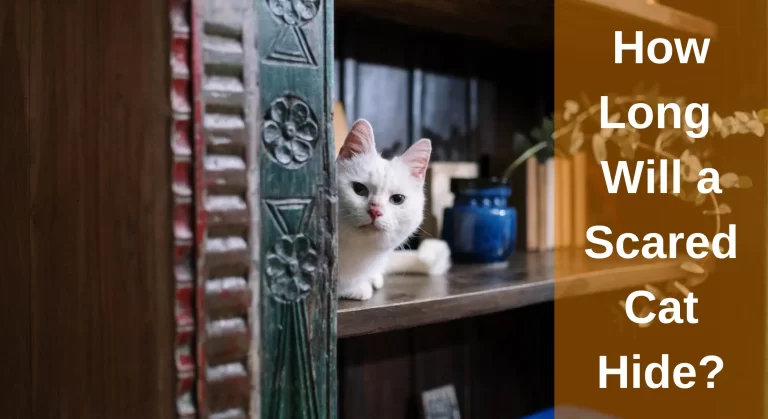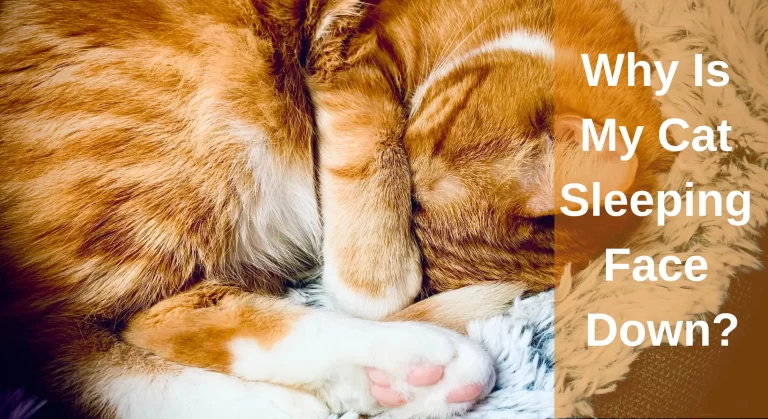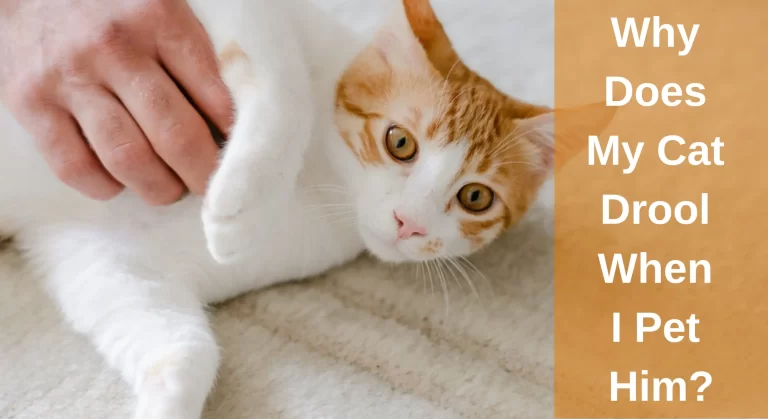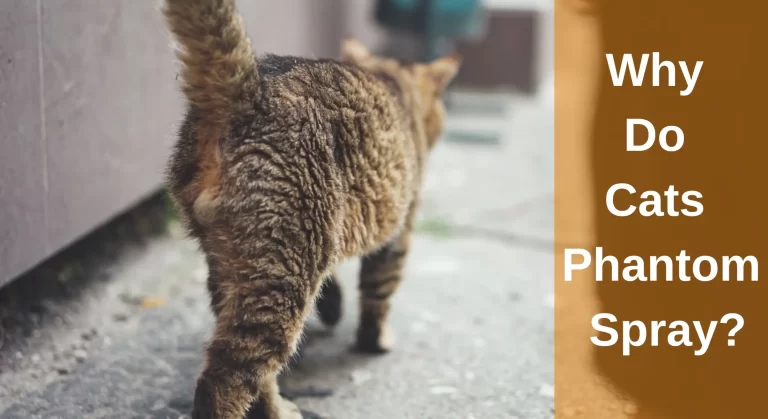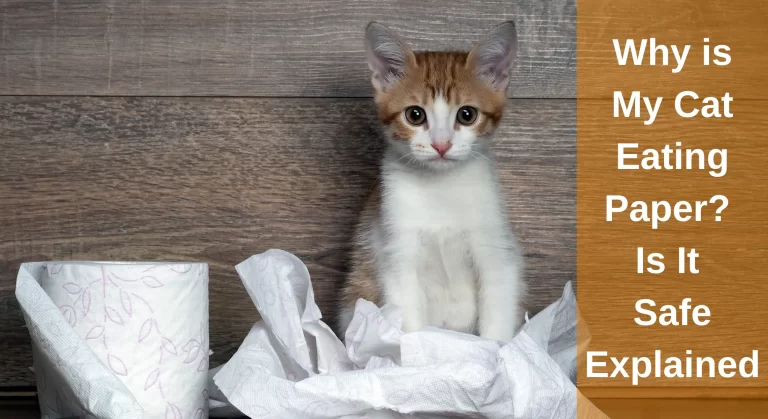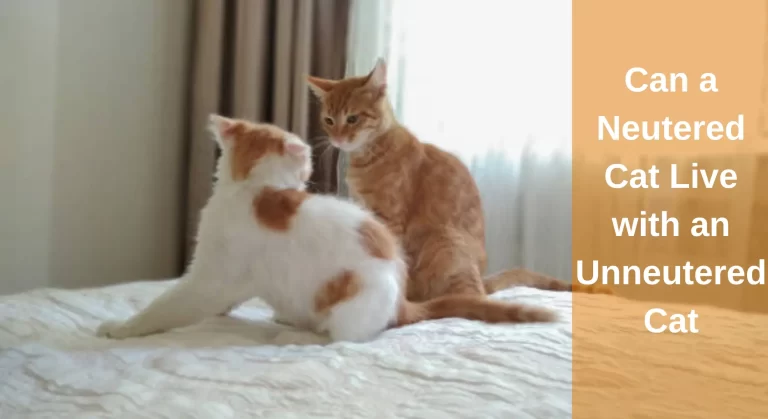Why Does My Cat Follow Me Everywhere And Sleeps With Me?
Cats are known for their independent nature, but if you are a cat owner, you may have noticed that your feline friend likes to follow you around the house. Whether going to the bathroom, cooking in the kitchen, or relaxing on the couch, your cat is always there by your side. You may wonder, “Why does my cat follow me everywhere and sleeps with me?
Cats follow their owners around and sleep with them for various reasons, including bonding and affection, seeking attention, need for security, and separation anxiety.
If you understand your cat’s behavior, you can strengthen your bond and ensure that your cat receives the best care. In this article, we will explore the science behind cats’ behavior and the various reasons behind this behavior and provide you with some insights on how to interpret your cat’s actions.
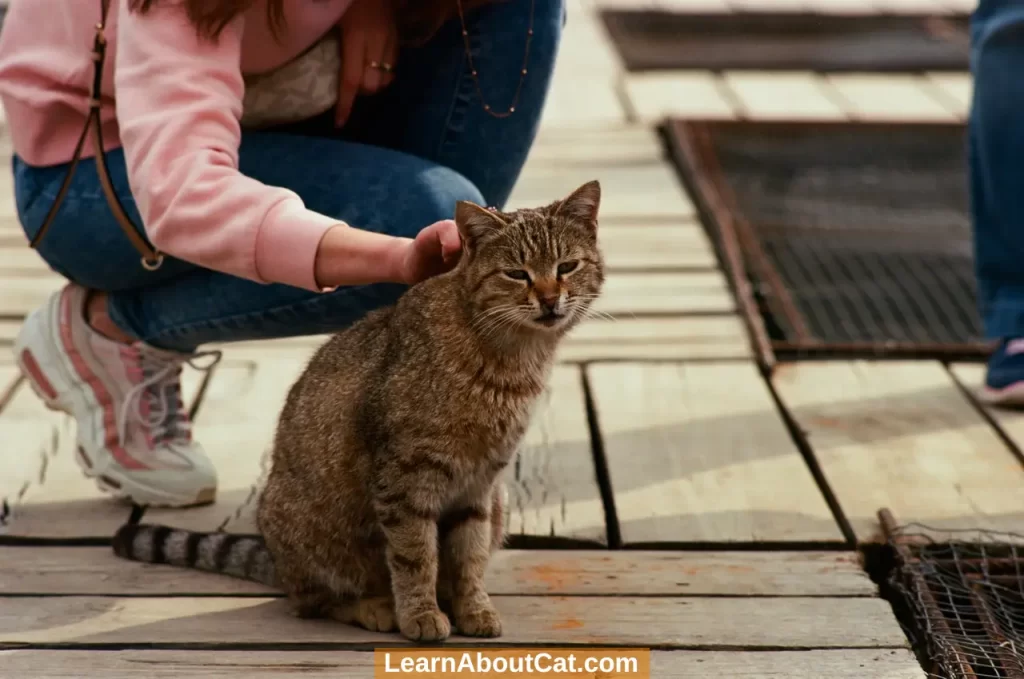
The Science Behind Cats’ Behavior
Humans have domesticated cats for thousands of years, and they have evolved to live with them. While cats may be independent creatures, they have developed a strong bond with humans, which is evident in how they follow their owners around and seek out their company.
Studies have shown that this bond is based on mutual trust and affection and is strengthened through positive interactions such as petting, playing, and feeding.
Reasons: Why Does My Cat Follow Me Everywhere And Sleeps With Me
If you’re a cat owner, you may have noticed that your feline friend seems to follow you everywhere. This behavior can be endearing, but it can also be a bit puzzling.
1. Your Cat Enjoys Your Company
Your cat may follow you and sleep with you because they simply enjoy your company. Cats are social animals who enjoy spending time with their owners. They are very attached to their owners, and following them wherever they go shows their affection for them.
Your cat enjoys spending time with their favourite person and is inquisitive about what you do, especially when you might be doing anything else at certain times besides binge-watching your favourite show on the couch, like making dinner or doing a load of laundry. Such activities will be far more entertaining to your cat companion than watching you giggle at a screen.
Moreover, cats feel secure and safe around their owners, which is why they prefer being around them.
Find Out: Do Cats Get More Affectionate With Age?
2. They need Your Attention
Cats require attention and affection from their owners. They are intelligent creatures that can sense when their owners are not giving them the attention they need.
When cats feel ignored, they tend to follow their owners around, hoping to get some attention. They may meow, rub against their owner’s leg, or even jump on their lap to get noticed.
Cats are excellent communicators, but they like to shout out their needs or decide to beg for food when they are in the restroom, much as children do.
Your cat undoubtedly requests you to watch her eat or clean the litter box if it brings you right there. A cat wants to play with you if they lead you directly to its toys. Playing with your cat should ideally take at least 15 minutes daily.
3. Cat is Showing Affection
It is often believed that cats are aloof, but in fact, they are extremely affectionate creatures. When a cat follows its owner around, it’s a sign that they love them and wants to show affection.
Cats express their love differently, such as by kneading, headbutting, or licking. Following their owners around is just another way of showing their love.
4. Your Cat is Hungry
Cats are natural hunters and need to eat frequently. If your cat follows you around, meowing or rubbing against your leg, it could be a sign that they are hungry.
Cats have learned to associate their owners with food, and following them around reminds them to feed them. Make sure your cat is getting fresh water and food if they seem hungry
5. You Have a Sick Cat
Cats can be quite vocal when they are sick or in pain. If your cat follows you around, meowing or crying, it could be a sign that they are not feeling well.
If a cat feels stressed or anxious, it might follow the owner. It is important to take your cat to the vet if you notice that its behavior is unusual. This way, any underlying health issues can be ruled out.
6. They’re Anxious Due to Something
If your cat sleeps next to you or sleeps between your legs and follows you around, it can be anxious about something else. The following are some potential catalysts for stress in cats:
- Relocating to a new house.
- Changing the brand of your cat’s food or litter.
- Unfamiliar neighbourhood cat alterations to your routine.
- A party or fireworks make loud noises.
- Bringing in a new pet or family member
Check Out: Why Do Cats Cover Their Faces When They Sleep?
7. Curious Cat
Cats are curious creatures and love exploring their surroundings. If your cat follows you around, it could be because they are curious about what you are doing or where you are going.
Cats have a natural instinct to investigate new things, and following their owners is another way to satisfy their curiosity.
8. Separation Anxiety
Cats with separation anxiety may follow their owners everywhere because they feel insecure and anxious when left alone. They may view their owners as a source of comfort and security and therefore feel the need always to stay close to them.
Some cats may even become clingy or demand constant attention from their owners to alleviate their anxiety.
Why Do Cats Have Separation Anxiety?
Separation anxiety is a behavioral condition that occurs when cats become overly distressed and anxious when separated from their owners or other familiar people or animals. Separation anxiety differs from normal feline behavior and can cause significant problems for cats and their owners.
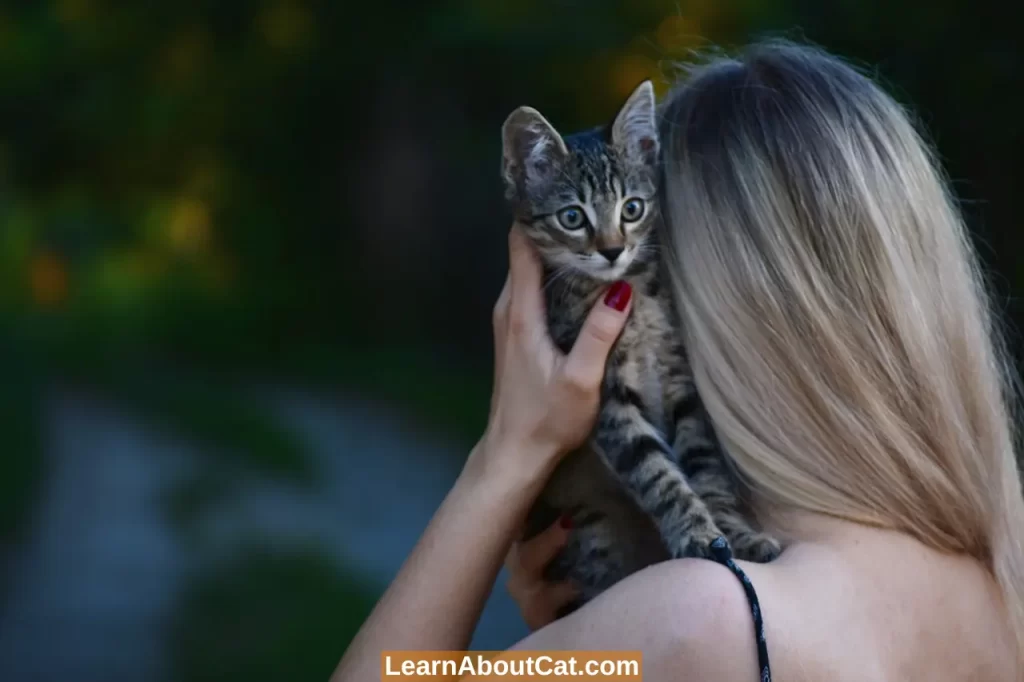
What Causes Separation Anxiety in Cats?
The following are a few instances of environmental factors and triggers that might cause a cat to feel anxious about being alone:
- Being abandoned or having their families frequently relocated as kittens results in a lack of connection with people and other cats.
- Stayed just indoors, sharing the house with only one other person and not having any other cats or animals.
- Avoid having any pets or other animals within the house.
- Being abandoned or having their homes moved regularly.
- A quick vacation or another unimportant event can also bring on separation anxiety in cats. You might wonder, “Why is my cat being so nice suddenly?” when you get back. She most likely did it out of a sense of loss and worried that you wouldn’t ever come back. This can cause your cat to experience separation anxiety, and she may begin to follow you around.
- Similar to how cats could become concerned about being removed from you when your routine suddenly changes. The most frequent situation is when an owner who used to spend the entire day at home has just started working full-time and must spend the entire day away from their house.
Also Read: How Long Can You Leave a Cat Alone Safely?
How Can You Tell if Your Cat Has Separation Anxiety? Signs of Separation Anxiety
Knowing the signs of separation anxiety will help you help your cat when needed. My cat follows me around and sleeps with me, so I know she’s scared. This hyper-attachment and persistent need for intimacy is the most obvious signs of attachment issues.
Additionally, keep a watch out for these indicators:
- Excessive Vocalization
- Loud or excessive meowing
- Frequent urination outside the litter box and on the owner’s bed
- Destructive behaviours like destroying houseplants or furniture.
- Overgrooming results in bald patches
- Diarrhoea
- Change in Appetite
- Aggressive Behaviour toward other
If you see any of these symptoms, especially if many appear at once, there is a significant chance your cat suffers from separation anxiety. Bring them to the vet for a confirmed diagnosis.
Also, Check Out: Why Do Cats Get In Your Face While You Sleep?
How to Help Your Cat With Separation Anxiety
If your cat is suffering from separation anxiety, there are several things you can do to help him. When you are away from home, providing your cat with a safe, comfortable environment is crucial.
- Providing a comfortable bed, toys, and treats can help alleviate anxiety.
- Increasing socialization and playtime with your cat can also help reduce anxiety.
- Gradually increasing the time your cat spends alone can help your cat adjust to your absence.
- Pheromone therapy, such as Feliway, can also help reduce anxiety.
Medication or seeking professional help from a veterinary behaviorist may be necessary if the above methods do not work.
Why Does My Cat Follow Me to the Bathroom?
Cats are naturally curious animals. They are intrigued by new sights, smells, and sounds, and the bathroom is a particularly interesting place for them.
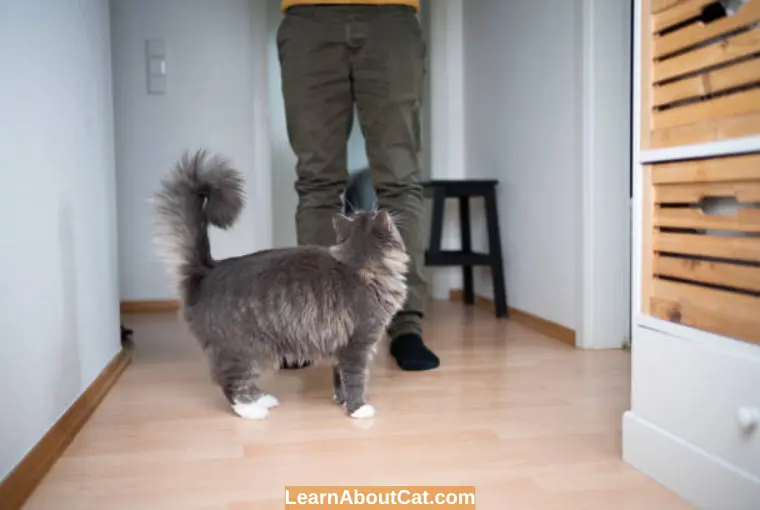
Your cat may follow you to the bathroom simply because they want to investigate this new space and see what you’re doing in there.
Additionally, the bathroom is often a quiet, private space where your cat can relax and feel safe. They may follow you to the bathroom because they feel comforted by your presence and want to share this peaceful space with you.
Cats are creatures of habit and routine. If you typically go to the bathroom simultaneously each day, your cat may anticipate this and follow you out of habit.
Check Out: Why Do Cats Like The Bathroom?
What to Do If a Cat is Following You Everywhere?
If your cat is following you everywhere, it’s generally a sign that they feel safe and comfortable around you. While this behavior is usually nothing to be concerned about if your cat’s constant attention becomes disruptive or excessive, there are a few things you can do to help manage their behavior:
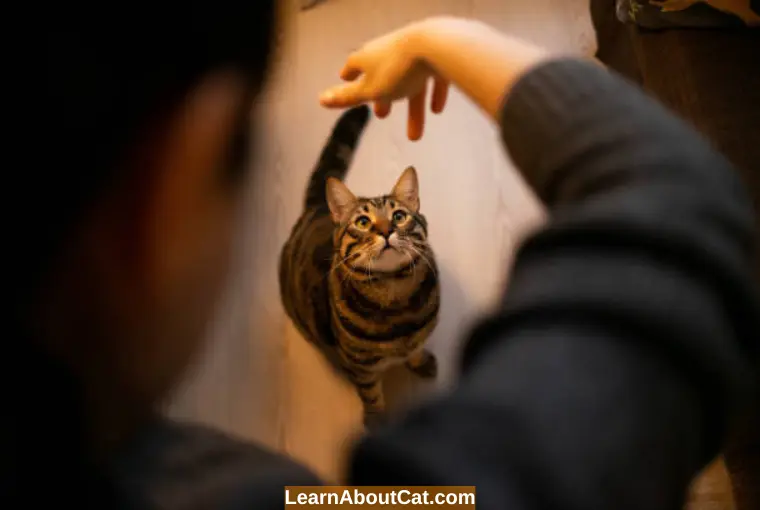
- Establish a routine: Cats thrive on routine, so try to establish a consistent schedule for feeding, playtime, and interaction. Doing this can reduce your cat’s anxiety when you are not around.
- Provide plenty of entertainment: Keeping your cat entertained when you’re not there is vital. Ensure they have plenty of toys, scratching posts, and other types of entertainment.
- Give your cat space: Giving your cat space and allowing him or her to explore and play independently is equally important as spending quality time with them. Their independence and clinginess can be improved by doing this.
- Consider getting another cat: If you’re worried your cat is lonely or bored, consider getting another cat to keep them company. It is important to introduce the new cat slowly and carefully so that it does not cause stress or anxiety to the existing cat.
- Consult with a veterinarian: Consult your veterinarian if your cat’s behavior seems out of character or excessive. It may indicate an underlying health issue or behavioral problem..
Frequently Asked Questions
Is it normal for my cat to follow me everywhere?
Yes, it is perfectly normal for cats to follow their owners around. Cats are highly social animals and enjoy interacting with their owners.
Is it safe for my cat to sleep with me?
Yes, it is safe for your cat to sleep with you as long as you and your cat are comfortable. However, make sure to wash your bedding regularly to prevent the buildup of bacteria.
Can cats get jealous if I spend time with someone else?
Cats can get jealous if they feel neglected or see someone else getting the attention they want. For your cat not to become jealous, it is essential that you pay attention to him and show him affection.
How can I train my cat to respect my space and privacy?
You can establish boundaries and provide your cat with designated playtimes and sleeping areas. If your cat behaves well, you can reward them and redirect their attention to something else.
Why does my cat meow at me when following me?
Meowing may be your cat’s way of communicating with you or getting your attention. Cats use vocalization to express their needs and emotions.
Wrap Up!
If your cat seems to follow you around and prefers your company over others, it’s likely a sign that they see you as their primary source of security and affection. While this behavior is usually nothing to be concerned about, if your cat exhibits signs of separation anxiety or their behavior seems excessive or disruptive, it may be worth consulting with a veterinarian to rule out any underlying issues. With a little patience and understanding, you can help your cat feel happy and secure in your home.
Who is Isabella?
My name is Isabella, and I am a dedicated and knowledgeable cat enthusiast. With years of experience caring for cats and a deep love for felines, I made a mission to help other cat lovers navigate the challenges of cat ownership.

